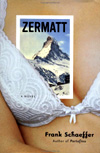|
Adolescent Fervor
Schaeffer’s talents land on biographical fiction
by Lloyd Babbit
Frank Schaeffer is no stickler for a particular artistic form. As a painter, his one-man shows have been displayed in a number of galleries here and abroad. As a filmmaker, he has directed, written, and edited both documentaries and full-length features. He has also written and co-written a number of non-fiction books on topics like art, capitalism, and being the father of a marine. So it’s no surprise that Schaeffer would also try his hand at fiction.
Nor is it a surprise to see the direction his three novels have taken.
Schaeffer is the son of the late theologian Francis Schaeffer. Like C.S. Lewis and G.K. Chesterton, the elder Schaeffer is revered by evangelical Christianity for bringing intellectualism to the faith. The Presbyterian pastor moved to Switzerland in the late 1940s and started L’Abri Fellowship, a Christian community similar to a commune.
It was there that Frank Schaeffer grew up, surrounded by fundamentalist Christianity and strict Calvinist doctrine. Likewise, the young protagonist of Schaeffer’s trilogy of novels is a boy being raised in a Swiss evangelical Christian community headed by his pastor father.
In Zermatt (Carroll & Graf, $25), the final of three stand-alone novels peering into the life of the fundamentalist Baker clan,14-year-old Calvin is on a ski vacation with  his family. There Calvin’s family is introduced along with the dysfunction present in his life. his family. There Calvin’s family is introduced along with the dysfunction present in his life.
His mother is an overly pious woman who prays loud, elaborate prayers before each meal, in hopes of converting eavesdropping vacationers. Calvin’s father is a foul-tempered man who feels trapped in his marriage and ministry. Calvin also has two older sisters, Rachael, who hopes to follow in her mother’s devout footsteps, and Janet, a mean-spirited harpy who would make an excellent dominatrix.
However, Calvin is the odd fellow out. His family’s extravagant attempts to witness to vacationers embarrass him. He longs to dance and listen to rock and roll. His prized possession is a collection of five Mad magazines hidden away in the attic at home. And Calvin’s awakening sexuality nears seismic in its intensity.
This becomes problematic. Initially, Calvin experiences some of the standard tribulations of puberty. His mother knocks on his door as he finishes masturbating, forcing him to spill hot chocolate all over the wall and sheets to cover up the evidence. He is visibly excited for several hours one day, so he walks hunched over, causing his mother to pray loudly for his “injury” at dinner one night (Calvin’s condition is miraculously “healed”). Calvin is forced to bear his mother’s use of terms like “Precious Seed Sack” and “Little Thing” when explaining sex.
Calvin’s life turns topsy-turvy when one of the hotel maids starts coming on to him. The older woman seduces him by degrees, until he finds her undressed and on top of him. This is, naturally, exciting for Calvin, especially when his mother hears the creaking bedsprings and knocks on the door.
It’s at that point that Calvin’s family unravels. Calvin’s mother is furious. His father takes Calvin’s side, blows up, and suffers a near-nervous breakdown. Calvin and his two sisters are caught in the crossfire. Calvin loses what innocence he once had, and soon learns that his mother is not as holy as he thought.
Zermatt is in many ways both a comedy and a tragedy. Young Calvin’s sexual faux pas are sidesplitting. There’s also the culture clash between the Baker family and the world around them. Everyone is an outsider to Calvin’s mother. Even other fundamentalists not quite strict enough in their doctrine are viewed with suspicion.
Schaeffer, who clearly has been there, captures the human comedy and tragedy beautifully. But at times his approach is heavy-handed and preachy. In his efforts to point out the sometimes-silly behavior of religious zealots, he can go over the top, especially in regard to Calvin’s mother.
That weakness aside, Schaeffer has painted a wonderful picture of a family caught in crisis, one that is both moving and hilarious. Of the three Baker family novels, this is by far the best. Here’s hoping Schaeffer sticks to fiction a while longer, before exploring yet another artistic medium.

April 15, 2004 • Vol. 14, No. 16
© 2004 Metro Pulse
|
|